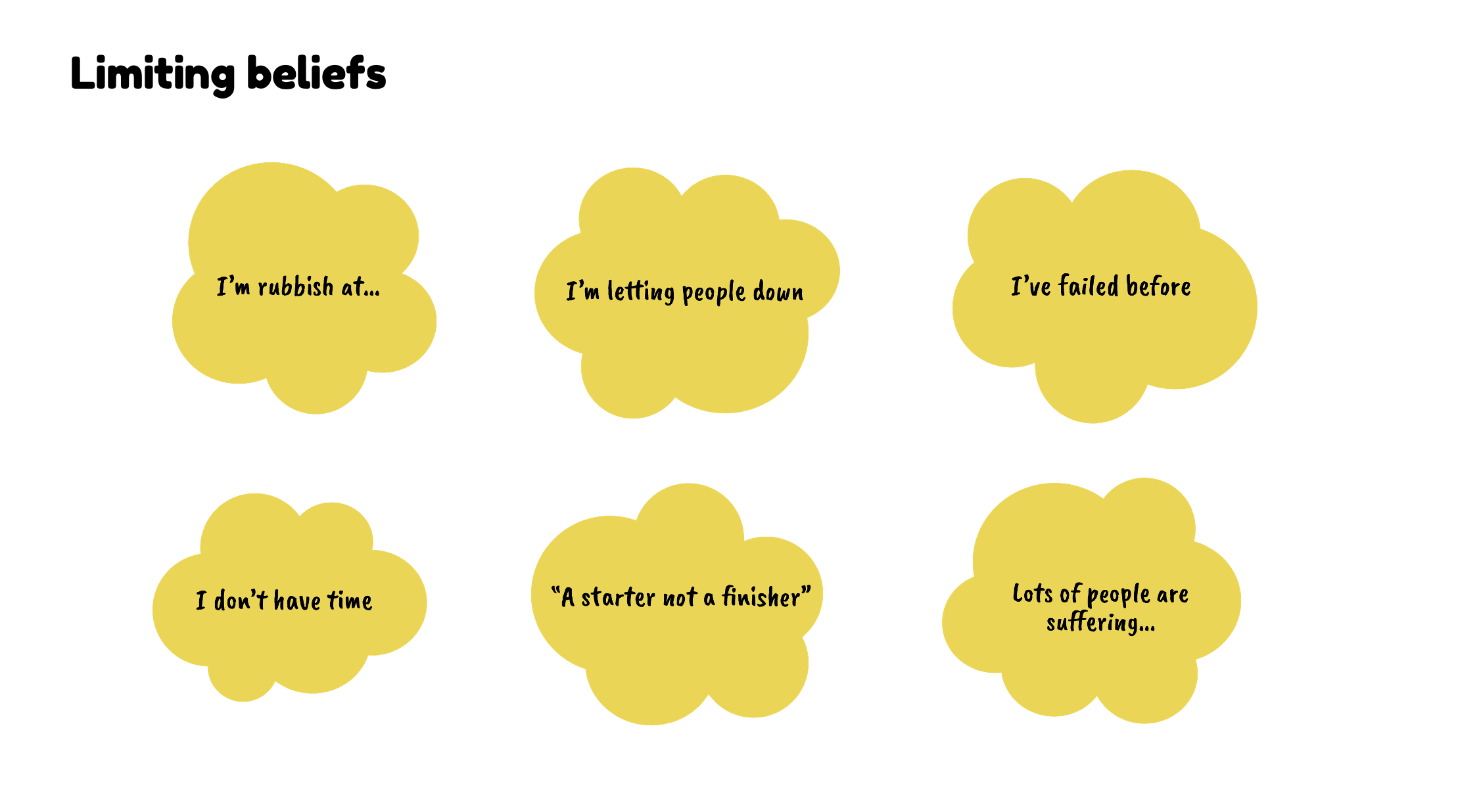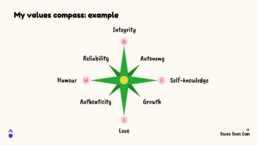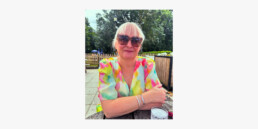Overcoming Limiting Beliefs: Embracing New Perspectives for Personal and Professional Growth
We all have beliefs about ourselves that shape our thoughts, actions, and ultimately, our careers and lives. Some of these beliefs serve us well, while others hold us back from reaching our full potential. These restrictive thoughts are what we call "limiting beliefs." Today, let's explore how to identify and overcome these beliefs to foster personal growth and achievement, drawing inspiration from examples shared by Mary Myatt in interview with me, Dr Emma Kell.
Understanding Limiting Beliefs

Limiting beliefs are deeply ingrained thoughts or perceptions we hold about ourselves, others, or the world around us. They often form early in life based on our experiences and environment. We may be coming to realise that these beliefs about ourselves have become outdated and started to hinder our progress and happiness.
It’s crucial to understand that these beliefs are not inherently good or bad. They're simply perspectives we've adopted over time. The key is recognising when these beliefs no longer serve us and finding the courage to challenge and reframe them.
Examples of Limiting Beliefs
Here are some anonymised examples cited by recent coachees:
 And here are a couple Mary and I discussed:
And here are a couple Mary and I discussed:
1. The Productivity Trap
I share a common limiting belief: the idea that to be successful, we must be busy all the time. This belief often manifests as "performative busyness" - the need to appear constantly occupied and overwhelmed.
I personally held this belief for years, thinking that as a business owner and teacher, I needed to always be visibly, sometimes performatively, busy. This led to multitasking, which ironically decreased my overall productivity and effectiveness. By challenging this belief, I learned that focused work and intentional rest are far more valuable than constant activity. I strive to embrace the ‘one thing at a time’ mantra.
2. The Suffering Comparison
Another limiting belief Mary discusses is the idea that one's pain or struggles are invalid because "others have it worse." This belief can be particularly challenging for those dealing with illness or mental health issues.
Mary gives an example of someone battling cancer who feels they don't have the right to complain or feel anxious because "other people are suffering more." This comparison minimizes personal experiences and can prevent seeking necessary support and care.
Reframing Limiting Beliefs

This coaching approach involves several steps to overcome limiting beliefs:
- Awareness: Recognise the belief and its impact on your life.
- Questioning: Challenge the validity of the belief. Is it based on fact or assumption?
- Reframing: Create a new, empowering belief that better serves your goals and wellbeing.
- Action: Act in accordance with your new belief to reinforce it.
Let's apply this to the examples provided:
Productivity Belief:
- Old belief: "I must be busy all the time to be successful."
- Reframed belief: "My success is measured by the value I create, not by how busy I appear."
Suffering Comparison Belief:
- Old belief: "I don't have the right to feel bad because others have it worse."
- Reframed belief: "My feelings are valid, and acknowledging them allows me to address my needs and practice self-compassion."
It’s essential to approach this process with self-compassion. Change takes time, and it's normal to sometimes fall back into old thought patterns. The goal is progress, not perfection.
Moreover, Mary points out that reframing our beliefs often leads to a more balanced perspective. In the case of the suffering comparison, acknowledging our own pain doesn't diminish the struggles of others. Instead, it allows us to cultivate genuine empathy - both for ourselves and for others.
As this coaching demonstrates, identifying and challenging limiting beliefs is a powerful step towards personal growth and fulfilment. By questioning the thoughts that hold us back and reframing them in a more empowering light, we open ourselves up to new possibilities and experiences.
Remember, this is a journey, and it's okay to take it one step at a time. Whether you're tackling beliefs about productivity, self-worth, or any other aspect of your life, approach the process with patience and kindness towards yourself. As you release these limiting beliefs, you may find yourself capable of achievements you never thought possible.
What limiting beliefs are you ready to challenge and reframe in your own life?
The Values Compass: A Guide to Personal and Professional Alignment
In our journey through our careers and lives, we often find ourselves at crossroads, facing decisions that shape our personal and professional paths. One powerful tool that I've developed in navigating these choices is what I call the "Values Compass." This concept has been a guiding light for me and many of those I've worked with, helping us align our actions with our core beliefs and expectations. It is one of the many powerful tools I share in the Being Your Best, Doing Your Best course that I've developed for Huh Academy: https://huhacademy.com/courses/18-byb-dyb-cohort-24-25/
You can hear me talk through this activity and other activities from the course with Mary Myatt for FREE here: https://huhacademy.com/intro-webinar/18-byb-dyb/
What is the Values Compass?
The Values Compass is a personal collection of principles that guide your decisions, fuel your passions, and define what you stand for. It's not just about what you believe in, but also what you expect from others and the organisations around you.
Why is it Important?
When we live and work in environments that reflect our values, we thrive. Conversely, when we find ourselves in situations that challenge our moral compass, it can significantly impair our wellbeing – mentally and sometimes even physically. I've experienced this firsthand, and it's why I'm passionate about sharing this concept.
Creating Your Own Values Compass
Here's how you can create your own Values Compass. Use this list of values (generated from my work with educators at all levels over the last five years) to help you - this list isn't exhaustive, so feel free to suggest your own values.
- List Your Top Eight Values: Think about the principles that guide you most strongly. You can choose a specific context if you like – as a parent, educator, professional, etc. You don't have to list them in any particular order at this stage.

- Identify Your North Star: Draw a basic compass (or print this one). If you could only choose one value, what would it be? This becomes your "North" on your compass. Write it above the 'north' point. For me, it's integrity. Nothing hurts more than having my integrity questioned or when someone makes unfounded assumptions about me.

- Define Your South: This is your second strongest value. For instance, I might choose reliability. It's something I've had to work on, but it means a lot to me, and I expect it from others too.
- Choose Your East and West: These could be contrasting values that don't necessarily sit comfortably together. For example, I might put empathy in the East because I often experience intense empathyfor others. In the West, I might place excellence, as I always strive to do my best.
- Fill in the Remaining Directions: Place your other values in the remaining spots on your compass, considering how they relate to each other. Here's an example:
Applying Your Values Compass
Once you've created your Values Compass, use it as a tool for reflection and decision-making:
- Hold it up against challenging situations you face. What does that feeling of frustration or dissonance tell you about your values?
- Use it to analyze situations where you've thrived or had the impact you wanted.
- Share it with your team or family to foster understanding and alignment.
Remember, there's no wrong answer. Your Values Compass is unique to you and can evolve over time.
Creating and using a Values Compass has been transformative for me, both personally and professionally. It's a simple yet powerful tool that can help you make decisions that align with your core beliefs, foster better relationships, and ultimately lead a more fulfilling life. I encourage you to take the time to create your own Values Compass – you might be surprised at what you discover about yourself in the process.
If you're happy to share your compass on social media or in the comments, please do! We'd love to see it. And if you'd like more where that came from, do join me and Mary Myatt on our brand new course with powerful coaching tools for leaders at all levels: https://huhacademy.com/courses/18-byb-dyb-cohort-24-25/
Take our quiz to find out how it might benefit you: https://mary-qm81cvoh.scoreapp.com
Removing OFSTED Single-Word Judgements. What Is the Big Deal?
A guest blog by Sarah Hussey.
For a brief time, this morning (2nd September), the news headlines about the immediate changes to OFSTED filled me with optimism. That is until I read some of the comments about this on a range of social media platforms. Particularly, a comment on the Facebook page for ‘This Morning ‘, which alluded to how easy the job of a teacher is and that inspectors should just turn up without giving any notice – blah blah blah – we have heard it all before!
Of course, initially I thought the negativity was not from anyone in the profession and then I saw the headline in The Telegraph – ‘Labour’s Ofsted system puts feelings above facts, says Birbalsingh.’ I know, I know these things are said to antagonise, but I couldn’t stop myself having a look at the X account of said ‘strictest headteacher in Britain’ where she makes her feelings very clear about the steps Labour are taking. She is very clear that the report card, even though we do not know what it will look like, will NOT give more clarity to parents and states that abolishing judgements because of leaders ‘feeling bad’ is a nod in the wrong direction. And that is why I need to explain why it is such a big deal and why the feelings of school leaders, school staff and communities are not to be belittled.
I have worked in the education sector for 30 years, starting as a midday supervisor in the early 1990s and becoming a head teacher in 2010 and now a coach, trainer and consultant. In all of those years OFSTED have worked with many different frameworks but have always used the one-word judgements. In September 2010, I secured the headship of a one form entry primary school, after teaching in a much larger school in various roles for 10 years. It was my first headship and my first headship interview – I genuinely did not believe that I would be appointed when I applied and thought it would be good interview practice. The school had already put the job out to advert twice and not appointed but there I was excited, ambitious and ready to make a difference! The school was rated as outstanding, this happened 3 years before my arrival and in the June before I started OFSTED sent a one page letter to parents saying that it was still outstanding – to this day I have no idea how they arrived at that decision. Inspectors would not cross the threshold of the school again until March 2015 (a wait of 8 years). So, here we are my very first, but not last, experience of how the one-word judgement was not a reliable or realistic picture of how well that school was actually performing. From the first day of my 13-year role, it was abundantly clear that the school was not outstanding – in fact it was far from it. However, if you are told that you are that good for long enough you run the risk of becoming: a) complacent or b) arrogant – or even worse both! In my earlier role, I was used to attending child protection conferences for vulnerable families and working with other professionals, here the safeguarding records were a notebook in an unlocked drawer! This changed overnight, in case you were wondering? If you wanted your child to sing all day, invite their granny for lunch and be able to enjoy lots of fun activities then this was the school for you and it was a very popular school, in fact it was oversubscribed every year. The school of choice in the local area. The reality was outdated teaching methods and learning that just did not happen quickly enough or deeply enough. I don’t know if I managed to hide my shock at the first governors meeting that I attended as it was not very different to the parish council meetings in the Vicar of Dibley! Nobody wanted to change how things were and as long as it had the outstanding badge very few people (apart from that new head teacher) could see any reason why they should. As a new head teacher, I thought that I would get some support from the LA, but of course we weren’t considered to be a high support school, so there was no funding at all.
Now, I know that some of what I have just said sounds very harsh, and I might appear to be a bit like the strictest head in Britain – I really am not! In fact, even quite recently a family moved their child to my school as they had heard that I didn’t really care about year 6 SATS. I admit this may not be the best advert for high standards in a school, but the point they were making, and they were right, is that I have always maintained that the summative assessments primary school pupils have to do are only a very small part of the picture of their success at school.
Let’s fast forward to March 2015 and the return of the inspectors, a 2-day full and rigorous process and the outcome was ... requires improvement. My reaction to this report was that I was incredibly proud of what it said about the school I had been leading for 5 years. Did I agree with the one (two) word judgment? We were good in some areas and the word outstanding was used when describing our pastoral care, but that wasn’t the overall ruling – even then, it seemed like a very strange system. Despite the new, not so shiny rating, the report was 10 pages of insightful information, and it described an effective and ambitious school. The community did not fall apart, in fact they supported the changes that needed to be made, and the school thrived.
Example number 2 of how the one-word judgment if taken at face value and not followed up with further investigations was unreliable and unrealistic. Can you see an argument for a better system emerging – one with a report card that gives parents more detail perhaps?
If you had believed the first judgment of outstanding or the second of requires improvement you would have been wrong on both counts!
Over the next few years, the landscape and rhetoric around OFSTED certainly changed dramatically. There were so many changes to the framework that the goal posts were moved right off the pitch! One of these changes was the introduction of the dreaded ‘Deep Dives’ which were unworkable in primary schools, particularly in smaller ones where some members of staff would be responsible for 2 or more subjects across the school. Members of staff on my team were kept awake worrying about the interviews that they would be having with inspectors about how their subjects were taught over 7 year groups, despite having very little leadership time in reality to do their role! A prime example of trying to make a secondary school model fit all schools.
So onward to 2020 and we were ‘in the window’ again and it felt very different to the other occasions. In the Autumn term of 2022, colleague heads of neighbouring schools had their ‘good badges’ removed and replaced with requires improvement and in conversation told me about the attitudes of the inspectors and their lack of empathy and refusal to listen to evidence that school leaders had to share with them. Heads handed their notice in, and governors started to look at joining MATs. The stress levels of anyone working in schools went through the roof and of course local authorities put more pressure on them as they needed school to stay ‘good’. Teachers were under so much pressure to ensure that the OFSTED needed to see ‘good’ in everything that was done – we didn’t stop to wonder whether one word could possibly describe everything that a school does for its community and beyond. There were so many things that were said to happen if you had a requires improvement or inadequate label:
- You could be slapped with an academy conversion order.
- Your school would be out of favour with parents – fewer children means less money.
- You could find it difficult to appoint new staff as they felt the pressure would be too much for them.
- Some providers would not allow you to have student teachers training in the school.
And the list goes on – how on earth were these schools supposed to improve?
Ironically both Ruth Perry and I had our last OFSTED inspections on the 14th and 15th of November 2022. In a fair and open system both schools should have had the same experience and the same outcomes – yet one head teacher lost her life and the other had to leave her role after becoming so ill that they could not continue.
As I said at the beginning, the reactions this week about the plans to remove this one-word judgment have really got me thinking. The changes are not about the government paying too much attention to school leaders feeling a bit bad – but about the utterly devastating damage that constant stress can do to school communities, individual human beings and their loved ones. You should never be seen as collateral damage to the profession! School leaders and their staff often function in a never-ending cycle of stress under a constant fear of not doing or being good enough. It is crippling to the human body and mind to live in a constant state of fight, flight or freeze – the cycle must be closed.
This is why these changes are a big deal – they will make a massive difference to the profession and the humans that work within it. Sometimes commentators like the ones on X and other platforms actually forget that is what we are – human.
I am hoping that this is the first step in a process that starts to support a profession that has a life-changing impact on our future citizens. I know that schools are effective and successful when professionals are treated with respect, trusted to do their jobs and held accountable in a fair and honest way. We can create amazing schools by leading with compassion, integrity and emotional intelligence. Believe it or not, feelings are important, human interaction relies on it and schools are full to bursting with humans – so I say it again – removing the one-word judgements is a big deal!
Thank you to Ruth Perry’s sister Julia, family and friends and all the other people with integrity and passion for fighting so hard for this to happen.



